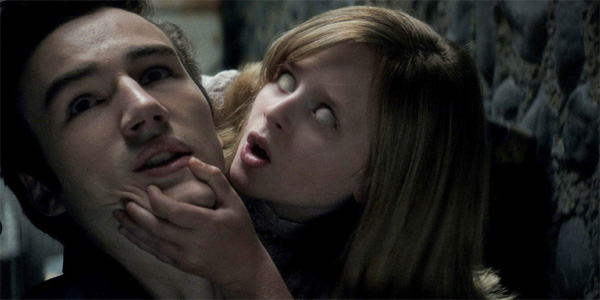The Ouija 2 Ending: Why It Had To Be So Dark

Your Daily Blend of Entertainment News
You are now subscribed
Your newsletter sign-up was successful
SPOILER WARNING: The following article contains massive spoilers for Ouija: Origin of Evil. If you have not yet seen the film, and don't wish to know any of the major details of the ending, please click away to another one of our wonderful articles!
While there are plenty of classic horror films that wrap things up in a nice little, happy bow at the end, writer/director Mike Flanagan's Ouija: Origin of Evil is not one of them. Instead of a classic, "Hooray! We got rid of the ghost" moment, the movie instead comes to an end with three of the major characters being dead, and the survivor being put in an institution. It's seriously dark stuff, particularly for a PG-13 movie, but it was something that the story just couldn't avoid, simply because of the established continuity in the original Ouija.
When I had the chance to talk about Ouija: Origin of Evil with Mike Flanagan earlier this month over the phone, one of the subjects we discussed was the film's finale and how it connected back to its 2014 predecessor. Because the filmmaker felt it was important to have the two movies sync up in their descriptions of what happens, he always knew where the story was going to wrap up, and just dived in head-first while fully acknowledging the darkness and emotional impact. Said Flanagan,
One of the things about the continuity we chose to keep with the first movie, meant three things had to happen. There was no way out it. By the end of the day, Doris was dead, Alice was dead, and Lina is in an institution - which is an incredibly brutal downer of an ending, especially after we try to make you care about everybody for so long. But we knew that, and there was some talk of, 'Well, maybe we can get away with a happier ending.' But it just didn't feel honest.
It would have betrayed the continuity with Lin Shaye's character in the first Ouija to have the story go any other way than it did in the film -- but Mike Flanagan did admit to me that did wind up changing an important part of that sequence with reshoots. Specifically, the mother-daughter moment where Alice Zander (Elizabeth Reaser) says goodbye to Lina (Annalise Basso):
We fleshed out one moment toward the end. There's a moment where Lena and Alice get to connect with each other and have a couple words right before Alice died, and that was not in the original [script]. That was an idea that came up in post, just because I felt like the characters had earned that, and I really wished we had built that in from the beginning. So they were kind enough to let us go back and get it.
Ultimately, the end of Ouija: Origin of Evil does stay in line with the way events are recounted in the first Ouija, and there's certainly something to appreciate in that attention to detail -- but there was an extra bonus in it all for Mike Flanagan as well. In a way, it turned out to be a way for him to stand up for PG-13 horror movies and show audiences that they can still provide an emotional impact. Said Flanagan,
There was always this kind of thing when we talked about the rating, that was like, 'Everyone is aware we're killing a nine year old, right? Everyone? Ok. Just wanted to say that out loud again.' So no one is surprised when we see the movie, because it's not going to end well. Just saying. But yeah, it's a downer, but one of the criticisms a lot of people level against PG-13 horror is that there is perception that they're not as dark and they don't kind of have the fangs narratively that their R-rated counterparts do. And that was another thing that I was excited about. It's going to be PG-13, but you know what? We're going to be as brutal as we can emotionally.
For those of you who saw the 2014 Ouija, did you appreciate the sequel's connection back to the first film? For those of you who saw the follow-up first, did you dig the darkness of Origin of Evil's ending? Hit the comments section below with your thoughts.
Your Daily Blend of Entertainment News

Eric Eisenberg is the Assistant Managing Editor at CinemaBlend. After graduating Boston University and earning a bachelor’s degree in journalism, he took a part-time job as a staff writer for CinemaBlend, and after six months was offered the opportunity to move to Los Angeles and take on a newly created West Coast Editor position. Over a decade later, he's continuing to advance his interests and expertise. In addition to conducting filmmaker interviews and contributing to the news and feature content of the site, Eric also oversees the Movie Reviews section, writes the the weekend box office report (published Sundays), and is the site's resident Stephen King expert. He has two King-related columns.
